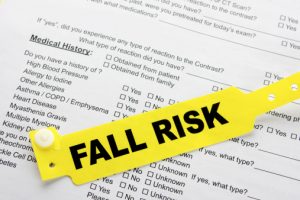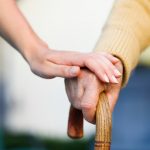 Falls in the elderly are shown to be caused by urinary tract infections (UTI) and blood and respiratory infections. These infections are commonly causes by a bacteria that has entered the body.
Falls in the elderly are shown to be caused by urinary tract infections (UTI) and blood and respiratory infections. These infections are commonly causes by a bacteria that has entered the body.
Falls are serious problems for the elderly as their bones are frailer, thus contributing to greater consequences such as fractures. Healing time also becomes impaired as we get older and the body simply cannot heal itself as it once could. Experiencing a fall can impair a senior’s daily life, and they may be unable to complete daily tasks as they try to regain their health. This can contribute to a loss of self-worth as well as depression, which can worsen preexisting medical conditions as well.
Advertisement
UTI, other infections may cause falls in the elderly
 Findings presented at the Infectious Disease Week 2015 showed that seniors who end up in the hospital after experiencing a fall often also have an infection. UTIs, blood and respiratory infections were found to be the most common infections in the elderly who experience falls. Researchers also suggest that although this is common in the elderly, younger adults could also experience the same results.
Findings presented at the Infectious Disease Week 2015 showed that seniors who end up in the hospital after experiencing a fall often also have an infection. UTIs, blood and respiratory infections were found to be the most common infections in the elderly who experience falls. Researchers also suggest that although this is common in the elderly, younger adults could also experience the same results.
Study investigator, Farrin A. Manian, M.D., said, “Over the years I’ve been struck by the fact that some of the more serious infections I treated were in people who came to the hospital because they fell. Even though many of the patients had vague early signs of an infection, such as weakness, or lethargy, it was the fall that brought them in.”
The researchers estimate that infections are responsible for 20 to 45 percent of falls experienced by the elderly. Falls by infection can result due to a drop in blood pressure or added confusion in those already diagnosed with dementia.
To achieve their results researchers examined 161 patients admitted to emergency because of a fall and who were diagnosed with a coexisting infection. Seventy-one of them had a UTI, 64 had a bloodstream infection, 37 had a respiratory infection and nine had an infection of the heart valve. Initially, 41 percent of participants were not suspected of infection as they did not show the typical symptoms.
The findings suggest that more consideration to the cause of falls should be given to infections, and how the person is feeling should be considered as well.
Other factors causing falls in the elderly
 Seniors are at a higher risk for falls because they have more medical conditions that can contribute to falls, and they also have weaker bones. One in five seniors will experience a fall, which will lead to broken bones or a brain injury, according to the Centers for Disease Control and Prevention (CDC). Furthermore, each year nearly 2.5 million older adults are treated for fall injuries.
Seniors are at a higher risk for falls because they have more medical conditions that can contribute to falls, and they also have weaker bones. One in five seniors will experience a fall, which will lead to broken bones or a brain injury, according to the Centers for Disease Control and Prevention (CDC). Furthermore, each year nearly 2.5 million older adults are treated for fall injuries.
Falls can contribute to broken bones, head injuries and fear of falling again, which may cause them to minimize or stop daily activities.
Other factors that can cause falls in the elderly include:
- Lower body weakness
- Vitamin D deficiency
- Use of medications
- Vision problems
- Foot pain or improper footwear
- Hazards like uneven steps, area rugs, lack of handrails
These risk factors may act alone or in combination with each other, increasing the risk of falls even more.
Home tips to prevent falls and how to fall-proof older people’s homes
 The risk of falls is high among older adults and can lead to many other health consequences. For these reasons it’s important to prevent falls whenever possible. Here are some home tips to prevent falls in older people.
The risk of falls is high among older adults and can lead to many other health consequences. For these reasons it’s important to prevent falls whenever possible. Here are some home tips to prevent falls in older people.
- Your first step for fall prevention is to make an appointment to see your doctor. Below are some questions you and your doctor should discuss in order to create a fall prevention plan.
- What medications are you on? Can they increase your risk of fall? (For example, do they lower blood pressure or have side effects such as dizziness?)
- Have you fallen before? Do you have an increased fear of future falls?
- Could your health conditions contribute to a fall? Does your blood pressure change often? Are you diabetic?
- Another suggestion is to keep moving. Being active can work wonders on fall prevention as it keeps your muscles and bones strong. Furthermore, balancing exercises, too, can help prevent falls.
- Wearing sensible shoes is important to prevent falls. You will want to avoid high heels if you’re a woman and opt for shoes with grip. Flip-flops and floppy slippers can also increase your risk of falls.
- Remove hazards from your home and frequently visited areas. Ensure carpets and rugs are secured to the ground or remove them completely. Be sure your home is free of clutter – no boxes or loose cords should be visible. Keep furniture, such as coffee tables, close to the wall and not in the middle of the room. Uneven flooring or loose floorboards should be replaced. Put a non-slip mat in your shower and bathtub.
- Keep your home well-lit to prevent bumping into things. Keep nightlights in the bedroom and hallways in case you need to get up at night. Keeping flashlights in easy to reach areas can be helpful as well.
- Optimize the use of handrails, add non-slip treads on wood floors, install a bar in your shower or beside the toilet, or put a sturdy seat in your shower.
Falls can be a scary reality for seniors, and there are many contributing factors that can increase the risk. By following these home tips you can better prevent falls, which can lead to serious and debilitating injuries.
Related Reading:
$4 million in grants to help seniors from falls
Four million dollars in grants was awarded by the U.S. government’s Administration on Aging to help seniors avoid falling. The funding will affect seven states in the next two years in an effort to help more than 18,000 Americans prevent falls. Continue reading…
Advertisement
Easy way to lower your risk of falls and injury
According to latest research, though, there is something seniors can do that can prevent falls. In fact, walking after a meal can help older people from falling down. That’s because standing up and moving around after eating could prevent the elderly from particular falls brought on by a sudden loss in blood pressure. Continue reading…
Sources:
http://www.eurekalert.org/pub_releases/2015-10
http://www.cdc.gov/HomeandRecreationalSafety/Falls/adultfalls
http://www.mayoclinic.org/healthy-lifestyle/healthy-aging/in-depth/fall-prevention
http://www.cdc.gov/Features/OlderAmericans
http://nihseniorhealth.gov/falls/homesafety
